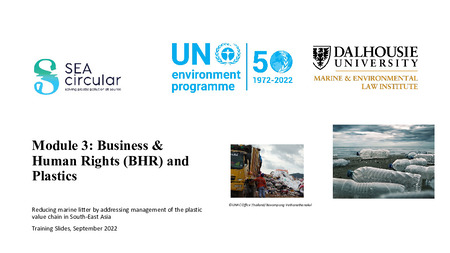| dc.contributor | Asia & Pacific Office | en_US |
| dc.contributor.author | Seck, Sara | en_US |
| dc.coverage.spatial | Asia and the Pacific | en_US |
| dc.date.accessioned | 2023-02-16T13:10:37Z | |
| dc.date.available | 2023-02-16T13:10:37Z | |
| dc.date.issued | 2022-09 | |
| dc.identifier.uri | https://wedocs.unep.org/20.500.11822/41855 | |
| dc.description | The primary learning objective of module 3 is to introduce learners to business and human rights frameworks, focusing on the UN Guiding Principles for Business and Human Rights and related tools. The module explores how a BHR approach to the plastics cycle that is grounded in a human rights and environment framework can enrich a circularity approach and help to overcome the human rights impacts of the plastics challenge. | en_US |
| dc.format | pdf | en_US |
| dc.language | English | en_US |
| dc.rights | Public | en_US |
| dc.subject | plastic waste | en_US |
| dc.subject | pollution reduction | en_US |
| dc.subject | business | en_US |
| dc.subject | human rights | en_US |
| dc.subject | Southeast Asia | en_US |
| dc.title | Module 3: Business & Human Rights (BHR) and Plastics | en_US |
| wd.identifier.sdg | SDG 3 - Good Health and Well-being | en_US |
| wd.identifier.sdg | SDG 10 - Reduced Inequalities | en_US |
| wd.topics | Chemicals and Pollution Action | en_US |
| wd.topics | Environmental Governance | en_US |
| wd.identifier.pagesnumber | 45 p. | en_US |
| wd.identifier.mettingsession | Reducing Marine Litter by Addressing Management of the Plastic Value Chain in South-East Asia, September 2022 | |


